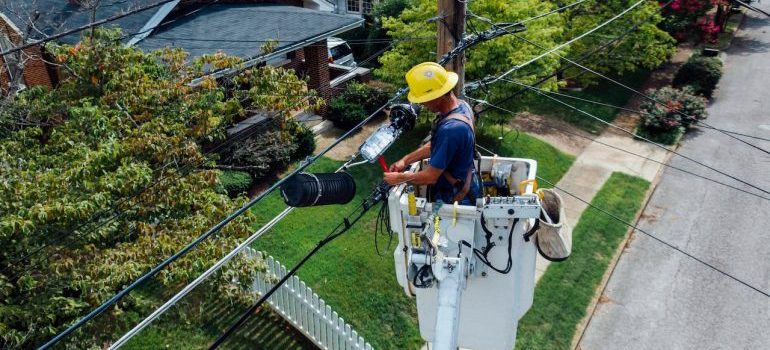Transferring utilities after moving is a very important task. The one that can easily be forgotten in the pile of hard relocation choirs. It is one of the crucial things you should do even before you move. If it has slipped your mind, it should be the first item on your agenda once you step into your new home. There are many state to state moving companies, but none can take this job off your back. You will have to tackle it as soon as possible, and this guide will show you how.
How to transfer your utilities after moving
Moving can be a stressful and chaotic experience, but there are some steps you can take to make the transition smoother. One of those steps is transferring your utilities. Not only is this an essential step in the moving process, but it can also save you time and money in the long run. Let’s take a look at how and why you should transfer your utilities after moving.

Transferring your utilities – how?
When transferring your utilities, it’s important to check applicable local laws or regulations regarding utility transfers. If you are moving from Texas to New York, you have to check what NY state laws require. In certain areas, you may be required to have your services transferred within a certain amount of time after moving in, so it’s best to familiarize yourself with these rules ahead of time.
Once you know what’s required of you, contact each utility provider (electricity, gas, water/sewer, etc.) and let them know that you need to transfer your service from one address to another. Depending on where you live and what type of services you need, different providers may offer different plans or packages that could save you money. It’s always worth looking into when talking with your providers. Finally, once all the details are worked out and coordinated with each provider, schedule a date for the transfer and make sure that it falls within any applicable timeframe as outlined by local laws or regulations.
Why transfer your utilities?
The primary benefit of transferring your utilities when moving is cost savings. If not done correctly (i.e., not having them transferred), then canceling one account while opening another at a new address could result in double billing or other charges being applied if service overlap occurs between accounts at different addresses. This means more money out of pocket for something that could have been avoided had the utility accounts been transferred properly from one address to another in the first place.

Start to organize transferring utilities after moving
It is never fun to move to a new home and discover that your power and water are off. While you can be without those luxuries for a few days, you should always transfer them before the move. Any reliable long distance movers Florida has to offer will remind you to do so. Still, it is easy to get distracted when you’re moving on your own. You haven’t done it, and now transferring utilities after moving is lingering in the air. There’s no point crying over spoiled milk – it’s time to act!
First of all, make a list of the service providers at your previous home for:
- Cable and internet
- Water and sewer
- Gas
- Electricity
- Trash and
- Phone
- Security system (if applicable)
Check your previous bills, and you will find a phone number and contact information. Get in touch with utility service providers and explain the situation. Ask them how long it will take to transfer your utilities to a new address. If there is a long waiting period, getting new utility providers will be much faster.
Of course, in the case of international moving, transferring your utilities after moving isn’t an option. You will have to use the services of the local providers.

Pay overdue bills
Your bills and debts don’t disappear just because you live in the new address. One of the questions that you have to ask your previous utility providers is whether you owe them anything. If you do, ask them nicely to send you the payment instructions through email. If that isn’t possible, tell them your new address at which you can receive any overdue bills. You will have to pay them eventually anyway, and if you do it soon, you will avoid paying interest. Do not take them lightly, as they can hurt your credit score.
Transferring utilities after moving probably won’t apply to water and sewer service
In the case that you’re moving locally, within the same city, notifying the providers for water and sewer about the change of address could suffice. However, if you are relocating to a new city, local providers will handle these utilities. Meaning you can’t transfer them. Still, you have to contact the new city’s public utility office and arrange for them to be turned on. It can take several weeks to do so, so transferring utilities after moving with long distance movers Houston is never a fun ride.
Does your HOA cover utilities?
If you’re moving to a community with a Homeowners Association (HOA), there is a chance that the association will be covering some basic utilities. HOA usually covers sewer, gas, and trash pickup. You will pay one monthly bill to the group instead of 5 separate bills to various utility providers. While the monthly cost will be the same, it will be much easier to pay your bills this way.

Organize a home energy audit
You should also look into receiving an energy audit once all your utilities are turned on at the new place; this will help identify any potential issues, such as inefficient appliances or poor insulation, for them to be addressed before racking up costly bills down the line due to wasted energy usage.
Scheduling a technician to perform a home energy audit after your move is a great idea. It will let you know if your new home needs insulation improvement, ductwork, or a furnace. Also, it will inform you how and where the air is leaking into the house. If there are any air leaks, they should be repaired. You can do it easily, simply by placing a sweep at the base of outside doors or by applying caulk around the drafty windows. Either way, you won’t lose anything if you do a home energy audit.
Be present during the utility service activation in your new home
Once you arrange to transfer utilities after moving with the long distance movers South Houston and set the date with local providers to turn on the rest of them, someone will need to be at your new home to meet the utility service personnel. Preferably you as the homeowner. There will be a lot of information, and it is better to hear them firsthand. In most cases, services companies won’t tell you the precise time of their arrival. Usually, they will give you a time frame of 4-6 hours instead of the precise time. It is important to be home in that time frame. If you miss them, you will have to schedule all over again.

Arm with patience when transferring utilities after moving
As you can see, transferring utilities after moving is quite a hassle. The utility service companies that the city is managing aren’t famous for their efficiency. It can take weeks before your power or water is turned on. But it can also happen in a matter of hours. Be calm when calling the utility providers.
It all depends on your luck and curtsy. The nice word is opening the iron door, so arm you with patience before contacting utility providers. Be polite and understanding, and maybe all transitions won’t be painful at all. Still, you must prepare yourself so that you might have to wait a while. After all, transferring utilities after moving is much harder than before your relocation. Try not to stress about it. Follow these steps, and your home will burst with electricity in no time.
Transferring utilities can be simple!
Moving into a new home doesn’t have to be stressful—especially when transferring utilities after moving. By following the steps outlined above—check into local laws/regulations; contact each provider; coordinate details; schedule the transfer date—you will save time and possibly money by avoiding costly double-billing charges that come with improper transfers between addresses. Lastly, consider getting an energy audit once all services are turned on at your new home so that any potential issues can be identified immediately and remedied before becoming too costly down the line! Good luck!
